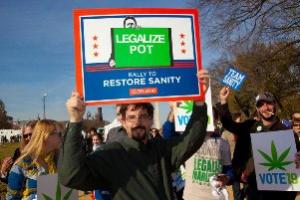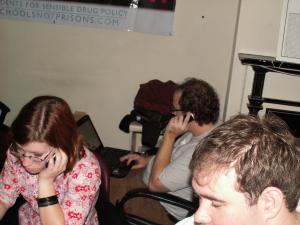Ballot measures, phonebanking, legalizers at the Sanity/Fear Rally. And why Prop 19 win or lose has been a winner for the cause.
Prop 19 has built a formidable coalition of supporters, and it's generated nearly $2 million in donations in the past month. It will need every bit of that cash and support to get over the top, but the campaign says it can still do it.
Will a Tea Party tidal wave swamp Oregon's dispensary initiative or will young voters be enthused enough to save it?
The trend line is looking good for marijuana legalization. It's gone up 15 points in 10 years and now stands at 46% nationwide.
It looks like South Dakota's medical marijuana initiative is in trouble, at least according to two recent polls.
Two more polls show Prop 19 losing, but with some grounds for hope.
Welcome to the special Election Day issue of Drug War Chronicle. A few fun and important notes:
- VOTE.
- If you read this soon enough, you can still phonebank (starting noon EST).
- Read my editorial on Alternet today to hear why win or lose today, Prop 19 has been a winner for the cause.
- We've focused a lot on Prop 19 this year, but there are other initiatives on today's ballots as well. This special issue has articles about initiatives in South Dakota and Oregon too (medical marijuana), and there is also a medical marijuana initiative in Arizona, and a series of local questions on the ballot in more than 70 cities across Massachusetts.
- Check back at http://stopthedrugwar.org today and tonight for breaking election-related news.
- VOTE.
A coalition of drug policy reform organizations organized a Prop 19/legalization presence at the Rally to Restore Sanity and/or Fear in Washington last weekend. A few of us made the "Sanity Restored" photogallery on the widely-read Talking Points Memo political web site. (Photo appears courtesy TPM and maletphoto.com.)
Other election-related activities included a post-rally phonebanking pizza party in the StoptheDrugWar.org/SSDP office:
back to top
Los Angeles Times readers woke up Monday morning to find a Proposition 19 ad wrapped around Section A. A day earlier, they were greeted with a full-page ad in the Sunday newspaper. The print ads are part of a last minute advertising campaign that also includes ads on Comedy Central's "The Daily Show" and "Colbert Report," millions of ad impressions on Google and Facebook, and a radio ad campaign highlighting the disproportionate harm that marijuana prohibition causes for communities of color is hitting five Southern California stations, three of them Spanish-language.
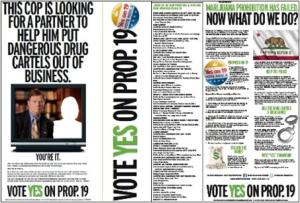
two page ad wrapping Sunday's LA Times
The ad campaign is being funded by a $1 million donation last month from financier George Soros and is being run not by
Yes on 19, the official Prop 19 campaign committee, but by a political action committee controlled by the Drug Policy Alliance.
The ad campaign is part of a frantic effort to sway voters and get out the vote as the clock ticks down toward Tuesday night. A barrage of recent polls have shown the measure losing, but Yes on 19 said Sunday that victory is still within reach.
The campaign cited youth energy, the get out the vote effort using state of the art technologies, general voter disaffection, and pollsters' likely undercounting of turnout generating by interest in the measure. "Together, these factors put 19 in a better position to win on Election Day than is indicated by the mainstream media narrative," campaign consultants Dan Newman and Chris Lehane argued in a memo Sunday.
"In the final days of this historic campaign, millions of Californians will be exposed in every media platform to the Yes on 19 message," said Stephen Gutwillig, DPA's California director. "We’re communicating to young voters in particular because they bear the brunt of marijuana enforcement and their turnout is crucial to Tuesday’s outcome."
Soros and DPA are by no means alone in joining the fight to legalize marijuana in California. In addition to advancing the public discussion on marijuana policy -- a Google search for "California Proposition 19" generates nearly 7.9 million hits -- the fight to pass Prop 19 has also generated the broadest outpouring of support for pot legalization ever. From labor to law enforcement, from identity politics organizations to the blogosphere, from entrepreneurs to elected officials, from law professors to doctors, from political organizations all across the ideological spectrum, a nice chunk of US civil society has rallied around Prop 19.
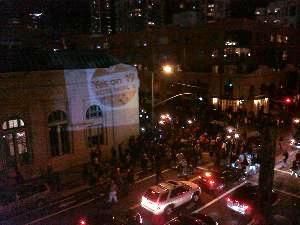
Prop 19 logo projected onto stadium side, World Series game, spotted Thursday night (twitpic.com/31xdog)
According to the Prop 19 campaign's
endorsements page, it has law enforcement backing from the National Black Police Association, the National Latino Officers Association, Law Enforcement Against Prohibition, former Seattle Police Chief Norm Stamper, former San Jose Police Chief Joe McNamara, retired California Judge Mike Grey, and dozens of other former and current police officers.
Prop 19 has been endorsed by more than a dozen prominent physicians, led by former US Surgeon General Jocelyn Elders, and more than 75 leading law professors. It has been endorsed by dozens of California elected officials, the Berkeley and Oakland city councils and the Humboldt County Board of Supervisors. Former Mexican President Vicente Fox even
spoke out about it last week, saying "May God let it pass."
The measure has the backing of the California Green, Libertarian, Socialist, and Peace and Freedom parties, the Young Democrats, the Republican Liberty Caucus, and the Progressive Democrats of America, as well as 10 county Democratic Party organizations. The California NAACP, the Latino Voters League, the Northern and Southern California ACLU chapters are all on board, too, along with dozens of other state and local organizations. A
mother's group was organized for the occasion.
In a real breakthrough, Prop 19 has also picked up significant support from organized labor. The Service Employee's International Union (SEIU) of California, the United Food and Commercial Workers Western States Council, and the longshoremen's union have all put their names and their political machines behind the initiative. So have a number of locals across the state.
Rolling Stone magazine publisher Jan Wenner kicked in $2,500, while insurance magnate Peter Lewis donated more than $200,000, Facebook co-founders Dustin Moskovitz and Sean Parker gave $70,000 and $100,000 respectively, while Dr. Bronner's Magic Soap president David Bronner kicked in $75,000, Men's Warehouse owner Robert Zimmer gave $50,000, and Washington, DC, activist and hemp store owner Adam Eidinger kicked in $25,000.
Other sizeable
reported late donations from less prominent figures have come in as well. In the month of October, not counting the Soros million, the Prop 19 campaign has generated nearly $900,000 in donations.
All that money is making the last minute ad blitz possible. But that's not all that's going on in the final days. A massive phone banking and get out the vote effort has been joined by FiredogLake and its
JustSayNow campaign, Students for Sensible Drug Policy, StoptheDrugWar.org, DPA, the National Organization for the Reform of Marijuana Laws, California Young Democrats, and California College Republicans.
For example, at UC-Berkeley, students are mobilizing around the initiative and are identifying it as the most important issue for young people in this election. In addition to tabling and canvassing, they held rallies this weekend, as did supporters in other parts of the state, all in an effort to create visibility and remind people to vote.
"Students are waking up and taking notice," said Kat Murti, a former president of Cal Students for Sensible Drug Policy and Yes on 19's Bay Area regional director. "Thousands of students lose financial aid each year due to marijuana offenses, including Berkeley students. This issue clearly affects and motivates them like no other political topic."
Let's hope that's the case, and that the ads, the media buzz, and the organizing draw out enough "unlikely voters" to change the world with a win on Tuesday.
back to top
Despite a lack of organized opposition, Oregon's medical marijuana dispensary initiative, Measure 74, faces an uphill battle as election day draws near. In a poll last week, it had only 40% support, almost unchanged from the 41% who supported it in an August poll.
Still, Measure 74 supporters are hoping that last minute campaign efforts, as well as an increase in "unlikely voters" will get the measure over the top.
Yes on Measure 74, the main group pushing the initiative, commissioned a
poll earlier this month of young, progressive voters inclined to sit out this year's election. It found that those voters were more than twice as likely to vote when told about the measure than when told about elections for state officer.
"The latest polls are using a likely voter model that is not favorable to us, so the poll numbers don't look so good," said campaign spokesman Anthony Johnson. "Forecasters are expecting a right-wing Tea Party wave, and what we are doing is calling voters under 40 who voted in 2008. If young voters come out like they did in 2008, we win in a landslide. It's all about turning out the vote."
The campaign was able to use Democratic Party phone banks in the get out the vote effort this week (the party endorsed the measure in October), but that's late in the game. In Oregon, voters vote by mail, not at a polling station, and the vote has been ongoing all month.
Since passage of the Oregon Medical Marijuana Act in 1998, the number of Oregonians with a medical marijuana recommendation has ballooned to more than 36,000. But without a dispensary system in operation, patients either have to grow their own or find someone they can designate as a caregiver to grow for them. There are currently over 19,000 people registered as caregivers.
Medical marijuana advocates attempted a dispensary initiative in 2004, but that effort was defeated. It got 42.8% of the vote.
Measure 74 would create a system of state-licensed nonprofit dispensaries and grow operations to supply them. It bars dispensaries within 1,000 feet of schools or residential neighborhoods. It sets annual fees for providers at $1,000 and for dispensaries at $2,000. Both growers and dispensaries would additionally pay a 10% sales tax on all medical marijuana transactions. Revenues from the dispensary and grow operations could boost state coffers from anywhere between $3 million and $20 million a year, according to a financial impact statement prepared by state officials.
While Measure 74 has reported only a few tens of thousands of dollars in donations this month, there is no organized opposition. Proponents are airing radio commercials in Portland and Eugene, and a legion of volunteers are putting up yard signs and doing get out the vote efforts across the state. There have been no opposition TV or radio ads.
"This has been a low-budget, grassroots campaign," said Johnson. "At the end, we got $25,000 to run radio ads by Tom Potter, the former police chief and mayor of Portland, and we're expecting another $50,000 to come. We also got $10,000 from Peter Lewis, and
Drug Policy Alliance head Ethan Nadelmann rounded up another $15,000."
"The opposition is law enforcement, and that's about it," said Johnson. "We have 11 voter pamphlet arguments on our side, and there are only two opposing. One of them is a combined effort of sheriffs, police chiefs, and prosecutors. The other is from Oregonians Against Legalizing Marijuana, which is in cahoots with Calvina Faye's
Save Our Society From Drugs."
Oregonians Against the Legalization of Marijuana executive director Shirley Morgan will not debate the issue or do interviews, according to Johnson, but Save Our Society From Drugs has a
web page attacking Measure 74. It warns that passage of the initiative could lead to the same "pot shop chaos" as has occurred in California, Colorado, and Montana. The web site also worries that dispensaries could be robbed and that passage could lead to -- gasp! -- "heavy vehicle and foot traffic in retail areas."
One thing helping the campaign this year is near unanimity and unity within the state's often fractious marijuana and medical marijuana movements. Despite bickering and backbiting in the run-up to the campaign, almost all of the state's advocacy groups are now on the same page regarding Measure 74. The one exception is the
Stormy Ray Cardholders Foundation, which has opposed this effort to create a dispensary system that would ease access issues for patients.
The hour is late for Measure 74. Given that Oregon is a mail-in voting state, most votes have probably already been cast. Whether a last minute push now can make the difference will be known in a matter of hours.
back to top
Though the fate of California's Prop 19 remains unknown at the time of this writing, majority support in the US for marijuana legalization appears to be just a few years away. An all-time high of 46% of Americans favor legalizing marijuana, according to a Gallup poll released Thursday. The number opposed to legalization dropped to an all-time low of 50%. Support increased from 44% last year, continuing an upward trend in the past decade.
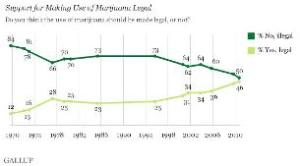
time is on our side
Support for legalization was at 12% in a Gallup poll in 1969 and climbed to 28% in 1978, then stayed flat at about 25% throughout the 1980s and most of the 1990s. By 2001, support had climbed to 31%, by 2004 it was at 34%, by 2006 it was at 36%. Since then, support has grown by 10 points to 46%.
"If the trend of the past decade continues at a similar pace, majority support could be a reality within the next few years," Gallup noted in its discussion of the poll results.
Pot legalization scored majority support among liberals (79%), 18-to-29-year-olds (61%), Westerners (58%), Democrats (55%), independents (54%), men (51%) and moderates (51%). It did least well among Republicans (29%), conservatives (30%), and people over 65 (32%)
Support varied among regions, from the West's high of 58% to 47% in the East, 42% in the Midwest, and 41% in the South.
The poll also asked about support for medical marijuana and found that 70% of Americans supported it. But that figure is down from 75% in 2003 and 78% in 2005.
The poll was based on live cell phone and land line interviews conducted October 7-10 with a random sample of 1,025 adults. Each question was asked of a half-sample of approximately 500 respondents. The margin of sampling error was +/-5 percentage points.
back to top
South Dakota Measure 13, the prairie state's highly restrictive medical marijuana initiative, was trailing badly in a Sioux Falls Argus-Leader/KELO-TV poll released Friday. Only 32% of likely voters polled said they supported the measure, while 62% said they opposed it.
The Argus-Leader/KELO-TV poll is the second in a week to show the measure trailing. A Nielsen Brothers poll released last Monday had it losing 53% to 33%.
If the polls are anywhere near accurate, it would be a devastating step backward for the state's medical marijuana movement. South Dakota already holds the dubious distinction of being the only state where voters rejected medical marijuana, but in 2006, it lost narrowly with 48% of the vote.
While the Nielsen Brothers poll provided no further breakdown of support and opposition, the Argus-Leader/KELO-TV poll did. Opposition to Measure 13 was strong with both men (61%) and women (63%), as well as among independents (57%) and Republicans (73%).
Only among Democrats were there high levels of support (46%), and even among that group, the initiative couldn't crack 50%.
In an analysis accompanying the poll results, the Argus-Leader said, "In the absence of definitive scientific evidence that marijuana has valuable medical properties, South Dakota voters seem swayed by the arguments opponents of ballot Initiative 13 make." It cited arguments from law enforcement and from the head of the South Dakota Medical Association as resonating well with voters.
Emmit Reistroffer, who heads the South Dakotan Coalition for Compassion, told the Argus-Leader he was surprised by the poll results. He said in his travels across the state, the greatest concern raised was that a retail network for marijuana sales might emerge. The initiative does not contain provisions allowing for dispensaries.
"South Dakota wants a conservative approach" to medical marijuana use, he said. "We want to teach voters how restrictive our measure is. Once they come to an understanding of that, I see where we have gained a lot of support."
back to top
Proposition 19, is trailing in more polls, adding to a run of disappointing poll results as election day draws near. According to the Talking Points Memo Polltracker, five separate polls in the past week have Prop 19 losing by an average of 50.3% to 42.6%. (A Yes on 19 internal poll not included in the Polltracker has the measure ahead 45% to 42%.)
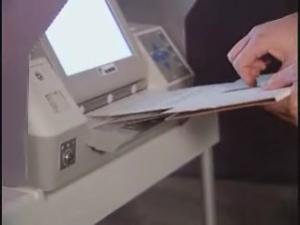
VOTE
A
SurveyUSA poll released last Wednesday had the measure trailing 44% to 46%, well with the poll's 4% margin of error. As SurveyUSA put it, "not yet enough breathing room for 'No' to be considered a clear favorite, but enough of a 'Yes' erosion for backers to be gravely concerned."
A
CNN/Time poll released last Tuesday was worse. It had Prop 19 losing 53% to 45%, with a +/-3.5% margin of error, among likely voters. (The numbers were slightly better for registered voters, 51% to 47%). The measure trailed among both men (46%) and women (44%) and whites (42%) and non-whites (49%). Only among liberals (76%), voters under 50 (57%), Democrats (55%), and in the San Francisco Bay area (55%) was Prop 19 polling a majority.
[Update: A final
Field poll released Sunday also showed the measure down.]
The CNN/Time poll measured responses from 1,328 registered voters and 888 likely voters. The poll was conducted by phone interview.
The SurveyUSA poll is worrisome because a series of SurveyUSA polls as recent as October 18 had Prop 19 winning, but it does hold some grounds for hope. It measured both likely and actual voters -- early voting has been going on for several weeks now -- and it also polled cell phone users. Among people who only had cell phones, Prop 19 led, 48% to 36%. It also led among people who rarely vote in midterm elections, but who said they'd be voting this time, by a margin of 53% to 39%. And it led among people who had not yet voted, 45% to 42%, while trailing among those had already voted, 43% to 54%.
Those poll findings suggest that the initiative could still emerge victorious if it can get the young and tech-savvy and the "unlikely voters" who may be motivated by the issue to actually get out and vote. Prop 19 and its allies have been whipping their get out the vote campaign hard, and this week's million dollar infusion courtesy of George Soros may still give it the oomph to get over the final hurdle on Tuesday.
back to top
